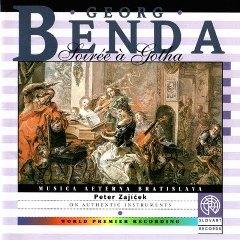Georg Benda - Soirée à Gotha (Musica Aeterna) [1996]
Georg Benda - Soirée à Gotha (Musica Aeterna) [1996]

(1) Sinfonia I Allegro 02:48 (2) Sinfonia I Andante 04:46 (3) Sinfonia I Allegro di Molto 02:13 (4) Cephalus und Aurore 09:46 (5) Sinfonia II Allegro 2:14 (6) Sinfonia II Andante 3:14 (7) Sinfonia II Allegro 2:27 (8) Scherzi Notturni Allegro 5:16 (9) Scherzi Notturni Andantino 01:36 (10) Sinfonia II Allegro moderato 8:04 (11) Marianne 10:49 (12) Sinfonia III Allegro 2:33 (13) Sinfonia III Andante sempre piano 1:47 (14) Sinfonia III Allegro 1:53 (15) Er ist dahin der Frühling meiner Blüthe 10:37 Kamila Zajickova - Soprano Madalena Kozena - Mezzosoprano Musica Aeterna de Bratislava Peter Zajicek – director
Jirí Antonín Benda (later Germanized to Georg Anton Benda) was the third child of Jan Jirí Benda (1686 - 1757), a minor village musician and weaver, and his wife, Dorota Brixi, offspring of a well-known musical family. Georg and his older brother Franz (Frantisek) are the two most famous of Jirí's five musician children. Georg became a notable Classical composer after attending the Piarist high school in Kosmonos, Bohemia, and a Jesuit college in Jicin. In 1742, his restless brother Franz found his lifetime job with King Frederick the Great of Prussia, a notable music lover who called for the rest of the Benda family to come join his musical establishment. Benda became a violinist in the Prussian court orchestra.
In 1750, he became Kapellmeister to Duke Friedrich III of Saxe-Gotha. Initially, he concentrated on church and instrumental music because the local clergy had blocked any idea of forming a musical theater. But they relented for the birthday of Duchess Luise Dorothea in 1765, for which occasion Benda wrote his first opera, Xindo reconnosciuto. This broke the ice, leading to the production of various short Italian operas (called intermezzos). Benda was sent to Italy to study opera, came back, and wrote several popular works. However, court theatrics ended after the Duchess died in 1767. The Duke himself died in 1772, resulting in Benda's duties as chapel music director being assigned elsewhere. He married and had seven children, several of them musically talented; the most famous among them was composer Friedrich Ludwig Benda.
In 1774, the Seyler theatrical troupe arrived in Gotha and commissioned Benda to write music for their German stage works. However, the company brought with it another composer who became the music director of the revived court theater. Benda resigned from the musical establishment of the Saxe-Gotha court. He traveled to Hamburg, but did not get a job there. He then spent the majority of his time in composition and elevated the art of the melodrama, to a popular form in German music. He also wrote German singspiels and a good amount of instrumental music, much of which became popular. Most of his compositions were written after he was 50. He returned on a pension, ultimately settling in Köstritz, where he died. Today, some of his offspring, along with other descendants of Jirí Benda, still perform as the Benda Musicians. ---Joseph Stevenson, Rovi
download (mp3 @320 kbs):
uploaded yandex 4shared mediafire mega solidfiles zalivalka cloudmailru filecloudio anonfiles oboom
Zmieniony (Czwartek, 04 Wrzesień 2014 16:21)








